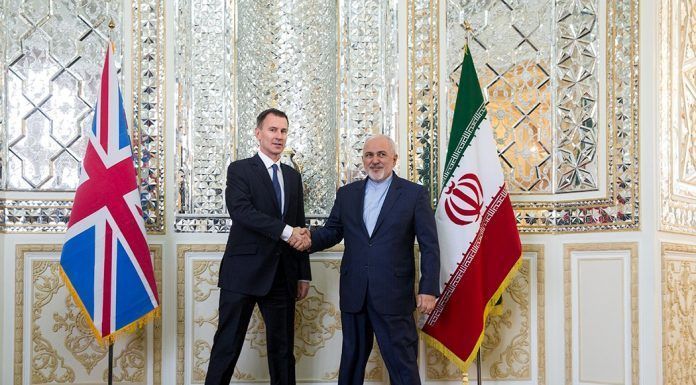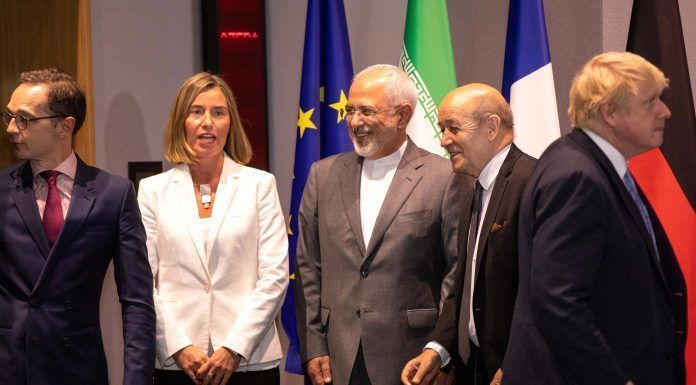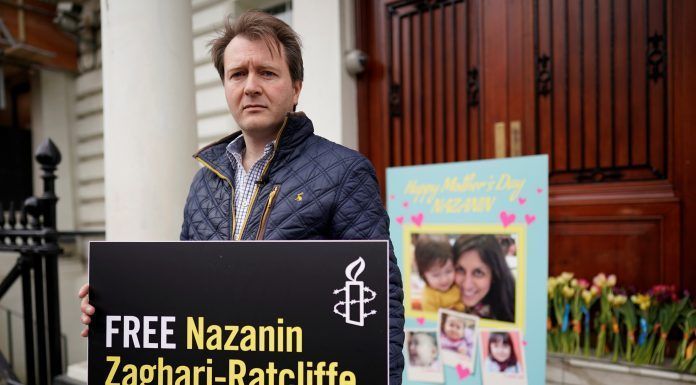June 20 – U.K. government officials met on June 17 to discuss growing tensions with Tehran as tanker attacks in the Gulf of Oman sparked fears of a conflict with the Islamic Republic.
Relations with Iran have become increasingly hostile after the U.S. reimposed sanctions on the country. The U.S. and the U.K. believe that recent attacks on tankers, pipelines and oil company offices in the Middle East have been carried out by Iran in retaliation for the sanctions.
U.K. Foreign Secretary Jeremy Hunt has said Britain is “almost certain” that Iran is behind attacks on oil tankers in the Gulf of Oman and has urged all sides to de-escalate. Iranian officials condemned the allegation in a meeting with the British ambassador to Tehran.
The U.K. government has tended to be on the same page as its European allies in relation to Iran, favoring negotiations and diplomacy. Yet its stance could shift significantly if Conservative Party leadership hopeful Boris Johnson becomes the country’s next Prime Minister, said Professor Ali Ansari, a Professor of Iranian History at the University of St. Andrews in Scotland, in an interview with Kayhan Life.
“It’s likely that Boris Johnson will become the UK’s next Prime Minister, which will mean that Britain will lean increasingly towards the U.S. view on Iran,” Ansari said. He added that he did not think Johnson’s election would increase the chances of a military confrontation.
The U.S. strategy on Iran prioritizes increasing pressure in the form of sanctions and greater restrictions on Iran’s nuclear weapons program.
“There will be a world of difference in terms of outlook towards Iran depending on the next cabinet, and significantly, on who becomes Foreign Secretary,” Professor Ansari explained.
The U.K.’s current Prime Minister Theresa May stepped down last month after Conservative MPs lost confidence in her ability to negotiate a deal on Brexit. The latest polls tap Johnson as the favorite to win the leadership race, with Jeremy Hunt his rival.
However Professor Ansari noted that the U.K. government’s reaction to Iran remained limited, and its strategy for dealing with Iran was still unclear as it focused on the upcoming leadership election and Brexit.
“There is a question mark over what the U.K. could add in terms of placing pressure on Iran. While the U.K. has a strategy for dealing with Iran, I don’t think it’s a fully developed strategy, mostly because its resources are being directed elsewhere, like Brexit.”
Calls to de-escalate tensions have been made by the Scottish Nationalist Party (SNP) foreign affairs spokesperson. Stephen Gethins asked the U.K. government to “focus its efforts” on reducing hostilities between Iran and the United States and to secure a diplomatic solution.
As well as exploring ways to reduce tensions with Iran, the U.K. government’s emergency COBRA crisis-cell meeting on June 17 looked at the UK’s options if Iran were to default on its obligations under the JCPOA nuclear deal. That’s after Iranian officials said the country could exceed its uranium stockpile limit by June 27.
The U.K. has been trying to bring Iran back to the negotiating table in an effort to salvage the nuclear deal. Tehran’s confirmation that it could start enriching uranium to weapons-grade has left the U.K. concerned that opportunities for diplomacy could be running out.
However Britain said it would ramp up its diplomacy over the next few days along with France and Germany. The three states met with EU political directors on June 20 to discuss Iran.
The U.K. has also opted to increase its military presence in the Middle East, sending between 20 and 30 Royal Marines to the Gulf this week, who will operate ships at Britain’s new naval base in Bahrain.
Conflicting media reports on June 17 over the move have left the reasons for the deployment unclear. Some news agencies suggest that the deployment was a reaction to the attacks on oil tankers in the region and a show of support to the U.S., while other reports published say that Marines heading to the Gulf are part of a pre-planned training exercise rather than a response to Tehran.
Professor Ansari said the U.K.’s primary concern was its relationship with the U.S., but this would not mean Boris Johnson would agree to a war with Iran. “Relations with the U.S. in Brexit Britain are going to matter more than Iran relations,” he explained. “Britain will hug its ally close, and it will do all it can by way of support, but this doesn’t mean that the UK will follow the U.S. into a confrontation.”
Despite strong backing from Conservative MPs, concerns over Boris Johnson’s ability to handle delicate diplomatic matters were raised by the husband of jailed dual national Nazenin Zaghari-Ratcliffe during an interview with BBC Radio.
Richard Ratcliffe — who is protesting his wife’s prolonged detention by staging a hunger strike outside the Iranian Embassy in London — said Boris Johnson had made his wife’s situation worse after suggesting that Nazanin was not in Iran to visit family but rather was in the country to train journalists. The Iranian government seized on the then Foreign Secretary’s comment to justify Nazanin’s detention.
Boris Johnson denied the claim during a leadership debate earlier this week.
Richard Ratcliffe also called Johnson a potential threat to national security.
| [amo_member id=”110708″ item-width=”250″ align=”left” item-margin=”20″ full-width=”yes” panel=”right”] |




